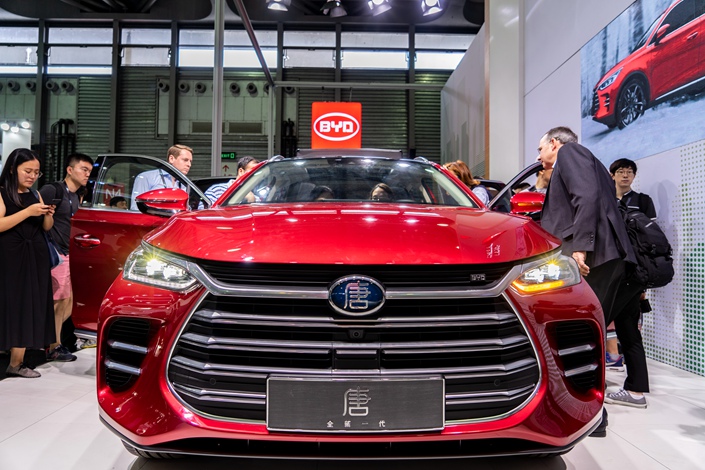BYD Injects $3.8 Billion to Quadruple Lithium-Battery Output

BYD Co. Ltd. plans to plow 25 billion yuan ($3.8 billion) into quadrupling its car battery output through 2020, despite the electric-vehicle industry seeing a widespread overcapacity of lithium battery production.
The Shenzhen-based automaker will increase its battery output from 16 gigawatt-hours (GWh) this year to 60 GWh in 2020, the company announced on Wednesday, as it launched a new facility in Xining, Qinghai province.
BYD said that the 10 billion yuan new factory will be the world’s largest producer of lithium batteries, with an expected annual capacity of 24 GWh next year.
The expansion comes despite a glut in the lithium battery output, as Beijing dished out generous subsidies and incentives to encourage growth of the development of new-energy cars. China is now the world’s largest market for such vehicles.
China produced 115 GWh of lithium batteries in 2017, though only 32% — or 36.9 GWh — were effectively utilized, according to the China Industrial Association of Power Sources, an industry data provider.
Industry experts said market speculation that the government will continue to shore up the electric car industry, despite having publicly announced it would reduce subsidies gradually by 2020, has been the rational behind BYD’s moves.
BYD is China’s biggest manufacturer of new-energy vehicles, and most of its battery productions are mainly for self-sufficiency. But the company also has plans to sell batteries to other automakers to broaden revenue sources.
The automaker is now competing with Fujian province-based Contemporary Amperex Technology Co. Ltd. (CATL), China’s top lithium-battery maker. CATL has said it would spend 30 billion yuan to boost its battery output to 50 GWh by 2020.
Globally, BYD is competing with U.S.-based Tesla Inc. and other peers from Japan and South Korea to cash in on global electric car demand. Tesla plans to expand its so-called gigafactory in Nevada to reach an output of 35 GWh and it also plans to build another plant in Shanghai.
Zhao Zuoyan contributed to this report.
Contact reporter Mo Yelin (yelinmo@caixin.com)

- 1Cover Story: China Carves Out a Narrow Path for Offshore Asset Tokenization
- 2Drownings Shake Chinese Enthusiasm for Travel to Russia
- 3Over Half of China’s Provinces Cut Revenue Targets
- 4Li Ka-Shing’s Port Empire Hit by Forced Takeover Amid Panama Legal Dispute
- 5In Depth: China’s Mutual Fund Industry Faces Overhaul After a Banner 2025
- 1Power To The People: Pintec Serves A Booming Consumer Class
- 2Largest hotel group in Europe accepts UnionPay
- 3UnionPay mobile QuickPass debuts in Hong Kong
- 4UnionPay International launches premium catering privilege U Dining Collection
- 5UnionPay International’s U Plan has covered over 1600 stores overseas






